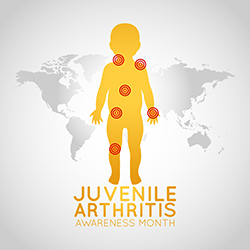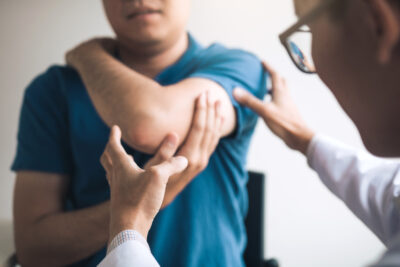July: Juvenile Arthritis Awareness Month

July is Juvenile Arthritis Awareness Month, a campaign initiated by the Arthritis Foundation to increase awareness about the symptoms of and treatment for juvenile arthritis (JA). Juvenile arthritis currently affects 300,000 children nationwide.
Juvenile or childhood arthritis can affect children of all ages, races and ethnic backgrounds. It is an umbrella term used to describe the many autoimmune and inflammatory conditions or pediatric rheumatic diseases that can develop in children under the age of 16. The types of juvenile arthritis share many common symptoms: pain, joint swelling, redness, fever, stiffness, rash, fatigue, loss of appetite, eye inflammation, and warmth. Childhood arthritis can cause permanent physical damage to joints. This damage can make it hard for the child to do everyday things like walking or dressing, and can result in disability.
Although there is no cure for juvenile arthritis, early diagnosis and aggressive treatment can control inflammation, relieve pain, prevent joint damage, maintain full movement of affected joints, and improve the child’s quality of life. Remission is possible, which means the disease is no longer active.
A complete medical history, physical examination, blood tests, and X-rays will help the DOC orthopedic surgeon eliminate other causes for the child’s symptoms. A child diagnosed with juvenile arthritis may require a treatment team, including an orthopedic surgeon, pediatric rheumatologist, physical therapist, ophthalmologist, and dietician because most treatment plans involve a combination of medication, physical activity, eye care, and nutrition.
An important part of a JA treatment is teaching the child the importance of following the treatment plan prescribed by the healthcare team. Self- management is about the importance of the choices made each day to live well and stay healthy. The Arthritis Foundation provides resources for parents, kids and teens with important strategies to manage meds, activity, and eating habits. The Foundation hosts conferences and camps for parents and children. Learn more at arthritisfoundation.org.
Children with juvenile arthritis can often fully participate in activities when symptoms are under control. With proper attention, most children with juvenile arthritis progress normally through their school years.
Sources:
Juvenile Arthritis | OrthoInfo
Childhood Arthritis | CDC
July Is Juvenile Arthritis Awareness Month | Arthritis Foundation
Juvenile Arthritis | Arthritis Foundation




